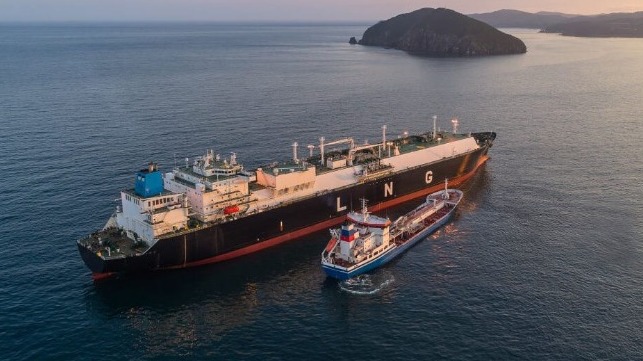T&E Says Maritime Switch to LNG is Irresponsible Due to Energy Crisis

European NGO Transport & Environment (T&E) renewed its efforts to stop the further adoption of liquefied natural gas as a marine fuel calling the industry’s switch to LNG “irresponsible in times of energy crisis.” The environmentalist group which has long been critical of methane pollution from LNG issued a new report citing the competition from the maritime industry as Europe struggles to achieve energy independence.
“With gas supplies so tight and prices so high, there’s simply no justification for shipping companies to switch to gas. It isn’t even good for the climate,” said Constance Dijkstra, LNG campaigner at T&E. “The EU should ditch plans to promote fossil gas in shipping and promote green hydrogen-based fuels instead.”
According to T&E, the shipping industry and many European politicians are pushing for LNG as a clean alternative to traditional fuels. They point out that LNG carriers were the first adopters of the fuel source and represent the biggest share of LNG-powered vessels. However, they contend with pressure from regulators and public opinion, other types of ships are being tempted by the gas option. This they say is happening at the same time that Europe is experiencing an energy crisis with skyrocketing prices and the potential that could lead to a complete cut-off of Russian gas exports, disrupting gas supply, and affecting people’s ability to heat their homes.
They cite the rapid growth in LNG-fueled ships noting that in 2018 only seven LNG containerships were built, but that the number has more than doubled in 2022 with 171 LNG containerships on order. Today, T&E says 923 ships can be powered with liquefied natural gas and 534 LNG-powered vessels are on order around the world.
In their new study, they predict that by 2030 Europe’s shipping industry will need over 6.3 million metric tons of LNG to power its growing fleet of gas-powered ships. T&E says that equates to enough gas to power seven million homes, enough to heat all the homes in Belgium or Sweden.
“This will only increase Europe’s dependence on fossil fuels, says Dijkstra. “As families across Europe struggle to pay their energy bills, the shipping industry is looking for new ways to burn gas. By 2030 nearly a quarter of Europe’s shipping could be running on LNG at a time where we should be reducing our reliance on fossil fuels. This cannot be allowed to happen.”
T&E says that Europe’s policymakers should be worried about the impact the switch to LNG-powered shipping will have on energy security. They have long said that the use of LNG as a marine fuel is more harmful due to the release of unburnt methane into the atmosphere. T&E contends that roughly 80 percent of Europe’s LNG used by ships today is worse for the climate than the fuels it replaces due to the release of the potent methane gas.
Preventing the uptake of gas in shipping must happen now, says T&E, before all segments of the maritime industry fall into the gas trap. They are calling on the EU to proceed with the FuelEU Maritime proposal and acerate the transition to hydrogen-based fuels.
The group recognized the adoption by the European Parliament of the goals to reduce greenhouse gas emissions and the first mandate for green fuels. T&E called parliament’s steps the “beginning of the end for fossil fuels in Europe's shipping industry.”
T&E had urged the EU to adopt stricter targets and a higher mandate. They are now calling on EU members to follow through enacting the standards while also taking steps to stop the continuing adoption of gas by the maritime industry reducing the competition to heat homes in Europe.
